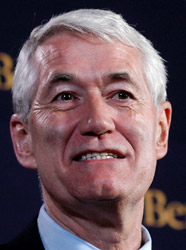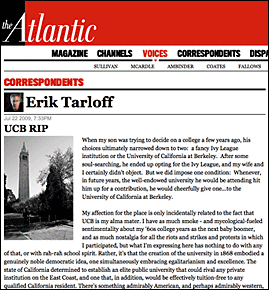Berkeley will remain great, but will it retain its public character?
Chancellor Birgeneau responds to the blog post, 'UCB RIP'
| 24 July 2009
In a July 22 blog post on the Atlantic website, correspondent Erik Tarloff decried the impending cuts at UC Berkeley, resulting from California's budget crisis, as a "great tragedy" whose damage is "likely to be irreversible." The following is a response from Chancellor Robert Birgeneau. Chancellor
Robert Birgeneau (Peg Skorpinski
photo)
Chancellor
Robert Birgeneau (Peg Skorpinski
photo)BERKELEY — Eric Tarloff's obituary for UC Berkeley ("UCB RIP") is premature. Like Marc Antony in Shakespeare's famous speech "I come to bury Caesar, not to praise him," Mr. Tarloff has eloquently praised the greatness of UC Berkeley and its unique achievement in becoming one of the greatest universities in the country and in the world. But, it is too soon to bury Berkeley and read the epitaph. Indeed, the real challenge for Berkeley is not whether it can remain one of the greatest universities — there is no doubt that it will — but whether it can do so and still retain its unique public character.
What sets Berkeley apart from Ivy League universities is the nature of our student body. Over one-third of our large student body of 25,000 undergraduates receives Federal Pell Grants, that is, their family income is under $45,000 per year. This is more than the number of Pell Grant recipients in all of the Ivy League universities combined. Even more remarkable, one-sixth of our undergraduates, over 4000 students, come from families whose income is $20,000 per year or less. Some 30% of our students are the first in their family to attend a four-year college.
As a public university, we offer these outstanding students the same quality of education that is available at the very well-financed and fine private universities. More of our undergraduates go on to earn Ph.D.s than those of any other university in the U.S. and, in the spirit of public service, overall there are more volunteers for the Peace Corps from Berkeley than from any other university.
This outstanding assembly of young people is taught by a faculty that is without question among the best in the world. Our renowned senior faculty have garnered more than their fair share of the world’s top awards including many Nobel Prizes, MacArthur genius awards and Pulitzer Prizes. Equally importantly, our junior faculty hold the same promise. Berkeley’s young faculty have won more highly competitive national awards than those of any other university in the country including the well-endowed great private universities.
Our graduate student body is equally accomplished. For example, we have more prestigious National Science Foundation Graduate Fellowship winners than any other university in the country. There is no doubt that we will continue to compete with other institutions for the hiring of the country’s most distinguished young faculty and in attracting top graduate students. The challenge, however, is whether or not they will continue to come to Berkeley because of our unique public character.
While in the short-term we must deal with a severe and rapid loss in funding from the State, we are confident that because of our academic preeminence and the loyalty of our alumni we will be able to devise a robust long term financial model which will make us progressively less dependent upon State funding. Indeed, we have been working on such a financial strategy for some time. The critical question though is: can we devise a viable long term financial model that will enable us to maintain the very special character of our undergraduate body? (I call our UG students "engaged and engaging.")
Ironically, it appears that the group that will be most disadvantaged by our funding challenges are not those who are truly low income people but rather the State’s middle-income families. Specifically, current federal, state and university financial aid plans protect the poor; however, the middle class — that is, those whose family incomes fall in the $60,000 to $120,000 range — receive limited aid and the current disinvestment in higher education by the State of California will only exacerbate their plight.
Public universities are the conduits into mainstream society for those from financially disadvantaged backgrounds and the key to the American dream of an increasingly better life for the middle class. The State of California's completely irresponsible disinvestment in the future of its public universities, is an epitaph, not for UC Berkeley — which has survived as a great university for 141 years and will do so for the next 141 — but for the shortsightedness of our State government for its citizens. That is the real tragedy.
The State of California has put the highest notion of public good that is embodied through its public universities at risk. In the elegant words of Mr. Tarloff, "It's a loss for everyone who cherishes a certain notion of how higher education, and society itself, ought to function."


